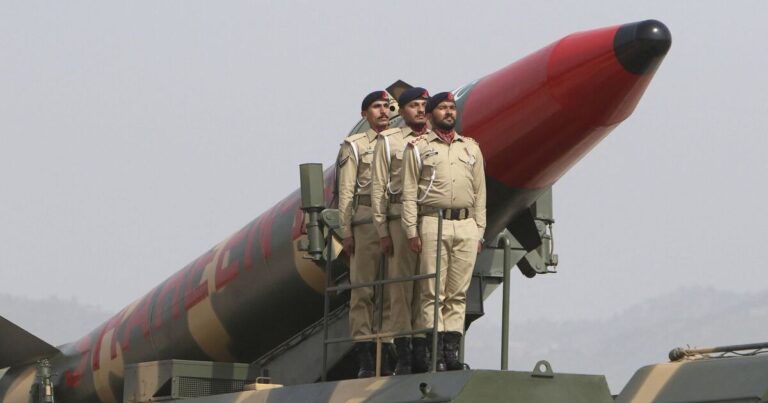Pakistan is “blackmailing the West” over fears its nuclear program could fall into the wrong hands if aid is cut, experts warned last night.
This follows a recent decision by the US to subject Islamabad’s nuclear program to new sanctions.
A move by Washington, D.C., sparked by a new defense and economic cooperation agreement between Pakistan and Iran, has identified three Chinese companies and a Belarusian company as suppliers of key components for Islamabad’s nuclear delivery system.
The US State Department said the sanctions target “proliferators of weapons of mass destruction and their means of delivery” and strengthen the global non-proliferation “regime.”
Pakistan’s long-range ballistic missiles, such as the Shaheen III, which has an impressive range of 2,750 kilometers, are of particular concern.
Sanctions were imposed against China-based Xi’an Longde Technology Development Co., Ltd., which manufactures filament winding machines for critical rocket motor cases. Tianjin Creation Source International Trade Co., Ltd. supplies liner acceleration systems. Granpect Company Ltd, which provides testing equipment for large-diameter rocket motors, and Belarus-based Minsk Wheels, which manufactures special vehicle chassis, his tractor factory.
But while they may hurt Chinese and Belarusian businesses, they are not enough to address the real threat of Pakistan’s nuclear proliferation.
Last night regional expert Kyle Orton said: “Pakistan has been closely linked to illicit nuclear and terrorist activities for 25 years.
“If you look at the nuclear programs of Libya under Gaddafi, Iran, and North Korea, they are all deeply connected to Pakistan.
“Pakistan is now a de facto colony of China, what Belarus is to Russia, and has a significant nuclear program with China.”
Pakistan has rejected claims that the companies are involved in its nuclear program.
Without naming the United States, Foreign Ministry spokesperson Mumtaz Zahra Baloch said the close relationship between the United States and India led to “discriminatory approaches and double standards” and “undermines the credibility of the non-proliferation regime.” It emphasizes and even undermines military asymmetry.” Regional and global peace and security goals. ”
She added; “This is leading to a military buildup (in the region).”
But despite strengthening ties with China, Russia, and Iran, Islamabad remains difficult to rein in.
In 2022, US President Joe Biden said that Pakistan “may be one of the most dangerous countries” in the world because it has “an uncoordinated nuclear arsenal.”
However, these comments were quickly forced to retract, with US officials later stating that Washington DC had “confidence” in Pakistan’s ability to secure a nuclear arsenal, and that a safe and prosperous Pakistan was in US national interests. He added that it was extremely important.
“Some may wonder why we are still doing business with Islamabad, given that the Afghan Taliban, who have killed more than 11,000 coalition soldiers, are controlled by Pakistani intelligence. “I can’t do that,” Orton said.
“The reason is that if we apply too much pressure, Pakistan could lose control of its nuclear program.
“Islamabad is threatening to allow really bad platers to acquire nuclear warheads, literally threatening the West with the prospect of suicide.
“And most of the time, this works.”

